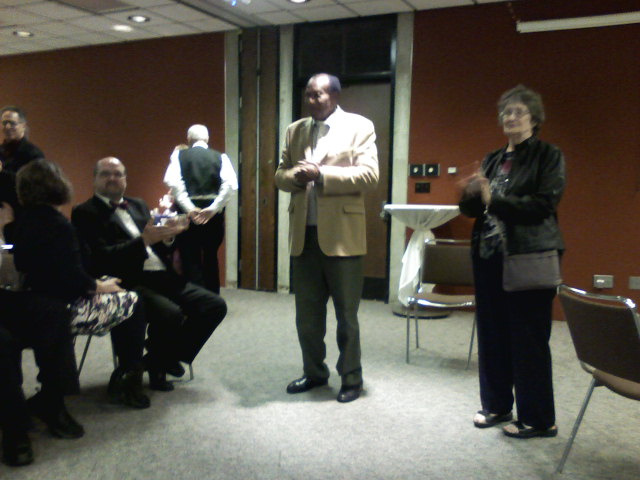
“The tenor always wins the soprano,” said internationally renowned bass baritone Simon Estes. The Iowa native and artist-in-residence at Iowa State University spoke prior to the Saturday, Nov. 7 student performance of Mozart’s “The Magic Flute” in ISU’s Fisher Theater.
Estes has sung the role of Sarastro, a peacemaker in the “The Magic Flute,” five times in his lengthy career, which has so far encompassed 102 roles at 84 opera houses around the world. He began his professional career in 1965 in a West Berlin performance of “Aida.”
“Not enough sense to even be nervous,” Estes said of his debut.
Estes said opera is “the most total of all forms of performing art” within the sphere of music. It involves music, drama, ballet, an orchestra and choir, costumes and make-up, a foreign language and a different time period.
Opera also “requires you to be more international in your understanding,” Estes said, and it requires “communication and cooperation,” making opera a genuine “social event.”

Taking questions in the Scheman Building for about 30 minutes before the show, Estes said the music has to come first, and the conductor, in general, has the final say. He explained the process singers must go through to be ready for opening night and some of the things that he’s learned along that way that he shares with students.
Some of the opera etiquette would easily apply outside the opera world, such as waiting until after rehearsal to express any concerns with the stage director versus sharing these concerns in front of the entire cast.
“Stage directors have very big egos,” Estes said, “and they think singers are idiots.” He advised singers to approach the stage directors privately by saying, “Mr. Maestro, I need your help.” This way you boost the person’s ego and are usually able to get what you want.
It’s the same with the conductor, he said. Never express your concerns in front of the cast.
Estes also advised new singers to “learn to pace themselves” and reminded them that “every role is important. The composer wrote that person to be a particular character.” The opera “is incomplete without it,” he said.
Estes also warned young singers to stay within their range.
“It is important for singers to know what their voice is suited for,” he said, or they may end up shortening their careers or damaging their voices. His advised a maximum of two performances a week for singers who want a long career.
In explaining the process singers go through, he said the singers must first learn the music, then understand what they are saying and finally learn their characters.
“Music first, then the acting,” he said.
It’s important for singers to form their own ideas of their characters prior to hearing the stage director’s notions. Singers should know not only their own roles but all the roles and should arrive on the first day with all of their music memorized.
Estes said he wondered why, in his experience, the female singers always seem to have their music memorized before the males do. Someone in the audience suggested competition among sopranos for roles causes them to “live in fear” and motivates them to memorize the music quickly.
Estes said he thought the women were just more disciplined than the men, and discipline is something opera singers require, according to Estes, which includes no speaking the day before a performance, no smoking and no drinking.
There is a lot of discrimination and politics in opera, he said, letting students know that in the real world they may have the voice and the talent and still not get the part. It might go to the conductor’s friend, and that’s just how it is.
Estes himself has a talent for memorizing operas quickly, doing so in four long, 12- to 14-hour days of continuously listening to recordings. But he said that it really doesn’t matter whether singers can memorize an opera in four days, four weeks or a year.
What matters, he said, is the performance they give once they get onto the stage.
He said most operas are written in French, and Germany has the most opera companies of any country in the world at 67. Their opera season is 10 to 11 months long, with more than 20 different productions.
He also noted that opera singers don’t use microphones and so need “a voice that can fill up a house.” By comparison, if Frank Sinatra hadn’t used a microphone, no one would ever have been able to hear him singing over his orchestra.
“He’d still have made more money” than opera singers, Estes admitted wryly, but no one would have been able to hear him.
In reference to his former role in “The Magic Flute,” Estes was asked how long it would take him to step again into the Sarastro character. He said he doesn’t remember the role in English but thinks he could perform it again after one rehearsal in Russian.
Luckily for the student performing Estes’s old role, the Iowa State performance was in English.
Estes’ 99-county “Roots and Wings” concert series, in which he sings with local choirs
and showcases promising young artists, comes to Dallas County with a March 1 performance at the Waukee Theater Arts Center.

















